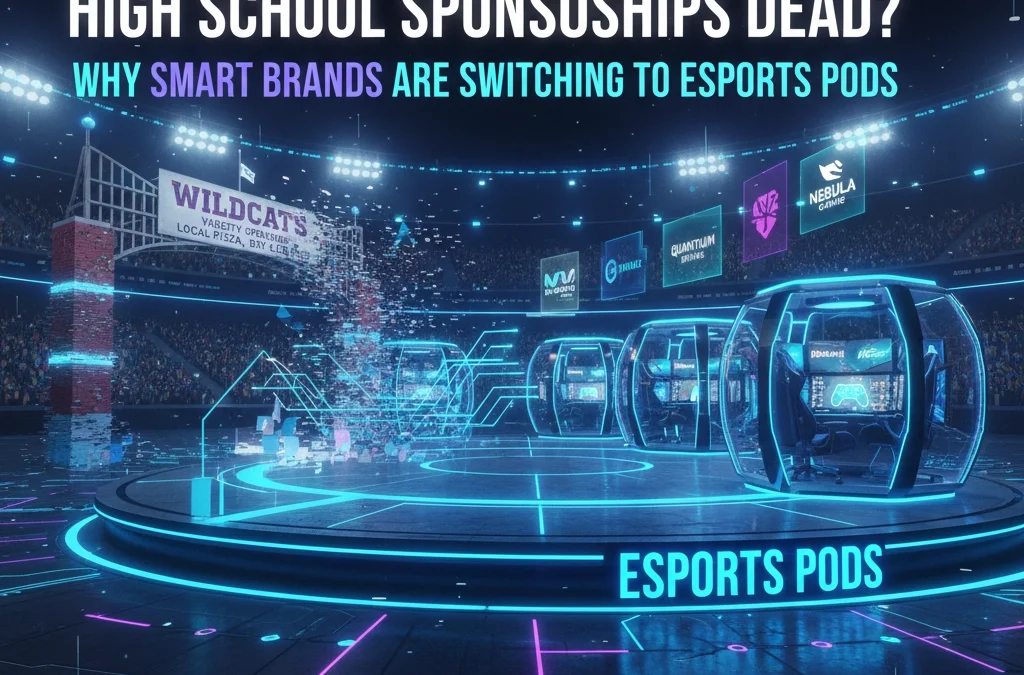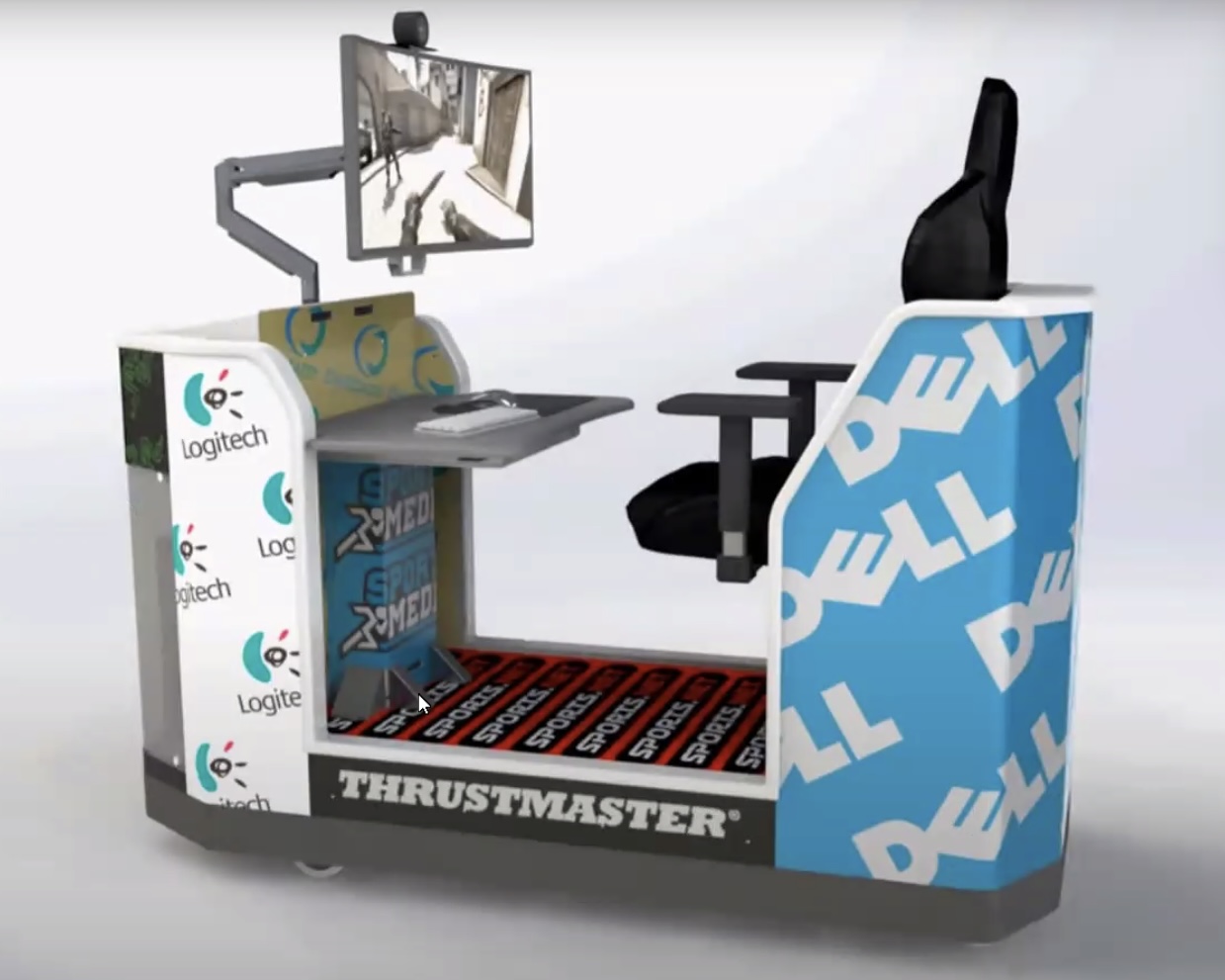The landscape of high school sponsorship is undergoing a seismic shift that forward-thinking brands cannot afford to ignore. While traditional high school sports sponsorships aren't entirely extinct, they're facing unprecedented challenges that make them increasingly less attractive to Fortune 500 companies seeking meaningful engagement with the next generation of consumers.
The numbers tell a compelling story: public schools lost 1.2 million students in 2022-23 compared to pre-pandemic levels, with projections indicating an additional 2.4 million student decline by 2031. Meanwhile, esports events are attracting over 60 million viewers globally, with brands discovering they can achieve more authentic engagement through gaming communities than traditional sports venues.
The Decline of Traditional High School Sports Sponsorships
Enrollment Crisis Impacts Sponsor ROI
Traditional high school sports sponsorships are confronting a perfect storm of challenges that fundamentally alter their value proposition for corporate partners. The most significant factor is the dramatic decline in student enrollment across American public schools.
Seven states are projected to experience double-digit enrollment declines, with California alone expected to lose nearly one million public school students by 2031. This enrollment crisis directly impacts the audience reach that sponsors traditionally relied upon, making cost-per-impression calculations increasingly unfavorable.
Geographic concentration of these challenges creates an uneven sponsorship landscape where brands must carefully evaluate market viability. Rural districts face the most severe impacts, while urban areas maintain relatively stable enrollment: forcing sponsors to adopt more selective, localized strategies rather than broad-based national approaches.
Budget Constraints Limit Program Investment
Financial pressures on educational institutions compound the sponsorship challenge. Proposals to eliminate critical funding programs like Title I, which currently supports 2.8 million vulnerable students, signal broader budget constraints that limit schools' ability to invest in sports programs and facilities that attract sponsor interest.
These budget limitations create a vicious cycle: reduced investment in sports infrastructure leads to declining program quality, which diminishes fan engagement and reduces the value proposition for potential corporate sponsors. Schools struggling to maintain basic educational services cannot prioritize the amenities and experiences that make sponsorship partnerships mutually beneficial.
Why Fortune 500 Brands Are Pivoting to Esports
Demographic Alignment Drives Strategic Shift
Esports uniquely captures the demographic that has systematically migrated away from traditional media consumption patterns. This alignment represents a critical strategic advantage for brands seeking to influence young consumers who have largely abandoned conventional advertising channels.
Unlike traditional high school sports constrained by geographic boundaries, esports events transcend physical limitations, making them especially attractive for global brands seeking widespread audience reach. The digital-first nature of esports perfectly matches how younger demographics consume content, creating natural engagement opportunities that traditional sponsorships cannot replicate.
Measurable Engagement and Flexible Partnerships
The esports industry offers significantly more flexibility than rigid traditional sports sponsorship packages. Rights holders actively tailor custom solutions to each client's specific needs, stemming from the industry's relative youth and hunger for sustainable corporate engagement.
Key advantages of esports partnerships include:
- Digital-first assets treated as primary offerings rather than add-ons
- Measurable engagement metrics and interactive opportunities
- Authentic community engagement that builds stronger brand loyalty
- Revenue models primarily driven by sponsorships rather than media rights
This sponsorship-centric model creates more direct brand-audience relationships and clearer ROI measurements, addressing the accountability demands of modern marketing executives.
The Revolutionary Potential of Esports Pods
Transforming Educational Engagement
Esports pods represent a revolutionary approach to combining education, technology, and brand engagement in ways that traditional sports sponsorships simply cannot match. These sophisticated gaming and simulation stations create immersive learning environments that capture student attention while providing brands with meaningful interaction opportunities.
The educational integration potential of esports pods extends far beyond entertainment. Students can develop critical STEM skills, strategic thinking, and collaborative problem-solving abilities through simulation-based learning experiences that prepare them for modern workforce demands.
Corporate Partnership Opportunities
Forward-thinking companies are discovering that esports pod partnerships offer unprecedented opportunities for authentic brand integration within educational environments. Unlike traditional sports sponsorships that primarily offer logo placement and event naming rights, esports partnerships can provide:
Simulation-Based Learning Experiences
- Aviation companies can sponsor flight simulation pods that teach aerospace principles
- Financial services firms can create economic strategy gaming environments
- Technology companies can demonstrate emerging technologies through interactive experiences
Talent Pipeline Development
- Companies can identify and nurture promising students through competitive gaming programs
- Internship and scholarship opportunities can be directly integrated into esports experiences
- Skills-based assessments can occur naturally within gaming environments
Sustainable Growth Trajectory
The growing global base of gamers suggests a promising future for esports investments, even as some traditional economic sectors face uncertainty. Early adopter brands are positioning themselves advantageously in what has become a billion-dollar industry that already surpasses the revenue and viewership of several traditional sports.
This growth trajectory is particularly compelling because it's driven by authentic engagement rather than manufactured interest. Students genuinely gravitate toward gaming experiences, creating organic brand exposure that traditional sponsorships struggle to achieve.
Strategic Implementation for Maximum Impact
Long-Term Community Investment
Success in esports requires a long-term commitment to supporting and growing with the community rather than expecting immediate returns. Brands that approach esports partnerships with traditional advertising mindsets often fail to realize the full potential of these unique engagement opportunities.
The most successful esports partnerships involve genuine community support, educational value creation, and authentic relationship building. Companies must engage with gaming communities in non-intrusive manners that add value rather than simply seeking promotional opportunities.
Diversified Portfolio Approach
Smart brands aren't necessarily abandoning traditional high school sports entirely, but they're strategically diversifying their sponsorship portfolios to include esports components that can more effectively reach and engage younger demographics in the digital-first landscape where these audiences now primarily consume content.
This diversified approach allows companies to:
- Maintain existing traditional sports relationships while exploring new opportunities
- Test esports engagement strategies with limited initial investment
- Scale successful esports partnerships based on demonstrated ROI
- Create integrated campaigns that span multiple engagement channels
The Inevitable Future of High School Sponsorship
The shift toward esports represents more than a temporary trend: it signals a fundamental transformation in how brands can meaningfully engage with the next generation of consumers. Traditional high school sponsorships face systemic challenges that make them increasingly less viable, while esports partnerships offer growing opportunities for authentic engagement and measurable impact.
Companies that recognize this shift early and invest in building genuine esports community relationships will establish competitive advantages that late adopters will struggle to match. The question isn't whether esports will become a dominant force in educational partnerships: it's whether your brand will be positioned to capitalize on this inevitable transformation.
The future belongs to brands that understand the power of simulation-based learning, community engagement, and digital-first experiences. Those still relying solely on traditional sponsorship approaches risk missing the most significant opportunity to connect with tomorrow's workforce and consumers.





